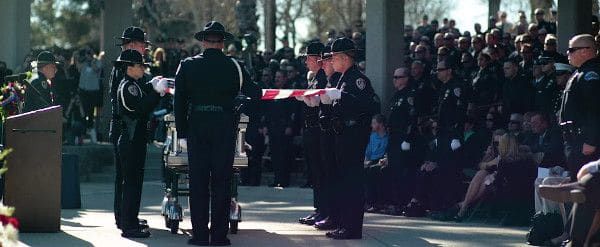Eye For Film >> Movies >> Fallen (2017) Film Review
Fallen
Reviewed by: Jennie Kermode

In 2016, 135 US police officers died in the line of duty - that's one in every 5,000 serving. It might not sound like a big risk, but consider it over a 40 year career and the picture looks different - especially when it's compared to other professions with similar salaries. Thomas Marchese's documentary looks at the human stories behind the statistics, visiting police stations across the country to hear from officers about the loss of colleagues, and also hearing from bereaved family members about their losses and the impact on their lives.
The documentary opens with discussion of what police work actually involves, a challenge to misleading ideas perpetuated by television. There's paperwork, of course, and social work, and dealing with petty offences, and most of the time the officers involved learn nothing about long term outcomes after their work is done. But about one in ten calls, the officers assert, is unpredictable, dangerous. Things can go wrong very fast. They routinely put their lives in danger for people they don't even know.

Michael Chiklis is an interesting choice of narrator, being known for his portrayals of officers both corrupt (in The Shield) and compromised (in Gotham); his presence instantly signals awareness of controversy and of the fact that there may be multiple sides to the stories we hear. This film, however, doesn't delve into such matters, beyond a simple acknowledgement that some people go into the profession for the wrong reasons. It's interested in the psychological impact of these losses and the reasons why officers are willing to face the risks they do. It's more successful at the former than the latter. Part of the coping mechanism involved seems to be a refusal to think about it too deeply; answers given seem genuine enough but rote. The most convincing reason, though not directly cited, is the importance of the sense of fraternity to which the officers frequently allude.
Watching this in Scotland, where the last recorded police death was in 1969 and the question officers ask themselves is why they risk getting their noses broken, attempting to understand the psychology at work requires a major cultural adjustment. Some awareness that things don't need to be as they are is suggested when officers in the film obliqely reference the policies and strategies that put them on the front line. There's an implication that they feel it's not their place to comment on these, yet one gets the impression that their insights are not effectively filtering back into the system. Marchese's film presents an opportunity to talk that seems new, touching on experiences that are still raw.
Does the film unduly valourise the police? That's a risk; it is certainly one-sided, but it's open about that, presented as a response to both inaccurate and mnegative portrayals in past films and other media. It will speak very strongly to officers and their families, and that is perhaps the point. Despite the simplicity of its structure, however, there is enough here to appeal to a general audience and it may well prove educational, especially where it undermines the glamour sometimes attached to the profession. Marchese's style is unfussy. Interviewees are shown at work or at home; archive footage fills in the gaps. Police car cams and bodycams record bullets coming towards them. The sound is muted but the point is made.
Reviewed on: 05 Sep 2017















